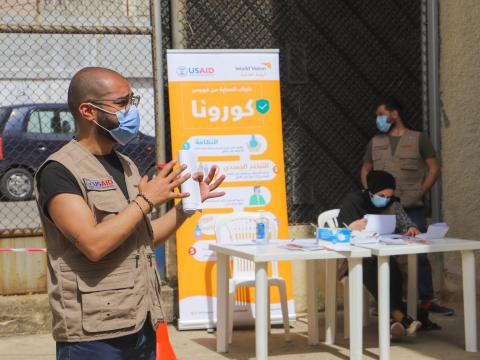Supporting families during multiple crises

For over two years, Lebanon has been inundated with multiple crises – the relentless economic and financial collapse which started in late 2019, followed by the Covid-19 outbreak at the beginning of 2020, and of course, the devastating explosion at the port of Beirut on August 4, 2020.
These crises would easily cripple the strongest and most stable economies in the world. How about a country that has been facing major challenges over the past decades and is home to hundreds of thousands of refugees? With the collapse of the most basic public services, Lebanese families find themselves without any form of support, hence, leading to an alarming increase in poverty across the country.
The heavy toll of the crises dramatically changed the “once” normal and sufficient life of 31 years old Tatiana and her family. “Before the economic collapse and Covid-19, we used to live a normal life. We never imagined that at some point we will need help just to provide the basic needs for our family,” says Tatiana, mother of two small girls. “Last year, my husband lost his job and was not able to find anything else. As for me, I was dismissed from my job just after having my second baby,” she adds.

In the hope to limit the risk of Covid-19 transmission, and at the same time, to alleviate the consequences of the economic crisis, World Vision, with the support of USAID's Bureau of Humanitarian Assistance (BHA), was able to provide essential hygiene items and COVID-19 awareness sessions to Tatiana and other vulnerable communities. “This support is very essential, and on many different levels. First, everyone needs to stay safe from Covid-19, we already caught it twice and it was very difficult. The Hygiene items will help us stay safe and clean. Moreover, I can use the money that I would have spent on the hygiene items to buy Milk for my four months’ baby instead. She has a medical condition in her stomach and can only drink a specific kind of milk which costs 320,000 (around 14 USD) every five days,” says Tatiana.

Thirty-one years old Elias is receiving the hygiene kit on behalf of his old father. “Our household consists of five individuals; my parents and two other brothers. Our income is very limited, my father is retired from the army and depends on his pension which lost its value due to the collapse of the Lebanese currency,” he says. “I am an interior architect but in the past two years, job opportunities were very scarce.”

Elias insists that this support couldn’t have arrived at a better time. “Last year my parents suffered Covid-19, yet we were not able to get all the needed hygiene items due to the financial situation. This support will definitely help in case (God forbids) we caught it again this year. In addition, we will be able to buy essential groceries with the money we can save from buying the hygiene items.”
In Beirut and Mount Lebanon, the BHA II project aims to support four municipalities and reach 100 shops, 100 households and 40 affected households in each municipality with specific hygiene kits that can help them stay safe and ease some burden from the economic situation.